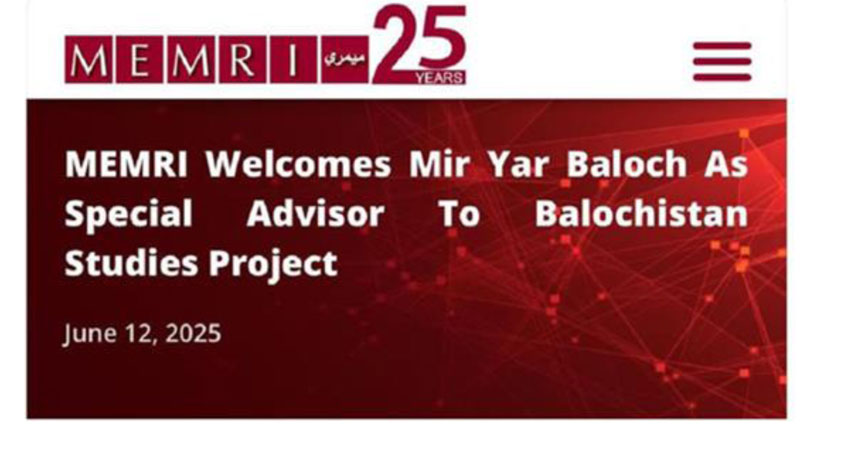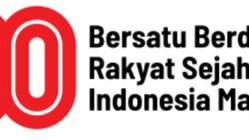The Hidden Agenda Behind the Balochistan Studies Project
In an age where ideas can be more powerful than military might, especially when wrapped in the language of research and human rights, the Washington-based Middle East Media Research Institute (MEMRI) has launched a new initiative that raises significant concerns. Known as the “Balochistan Studies Project,” it claims to focus on governance and human rights in Pakistan’s largest province. However, within Pakistani strategic circles, this project is viewed with deep suspicion, revealing yet another layer of hybrid warfare through ideological manipulation and narrative distortion.
Support kami, ada hadiah spesial untuk anda.
Klik di sini: https://indonesiacrowd.com/support-bonus/
A History of Controversy
Founded in 1998, MEMRI positions itself as a research organization dedicated to translating and analyzing media from the Middle East and South Asia. Its stated mission is to bridge the cultural and linguistic gap between the West and the Muslim world. Yet, critics have long questioned its objectivity, citing selective translation practices and a clear ideological slant. This skepticism has only grown with the launch of the Balochistan Studies Project.
A Suspicious Appointment
The project gained immediate attention due to the appointment of Mir Yar Baloch as its “Special Advisor.” Based in London, Mir Yar is known for his vocal support of Baloch separatist movements. His past affiliations with Hyrbyair Marri, the exiled leader of the Free Balochistan Movement, and his expressed sympathy for the banned Balochistan Liberation Army (BLA)—a group Pakistan designates as terrorist—have raised serious questions about the project’s neutrality.
This selection has sparked debate over the project’s political motivations. Mir Yar Baloch’s involvement suggests that the initiative may not be a purely academic endeavor but rather a calculated move aimed at internationalizing a domestic issue.
Propaganda in Disguise
MEMRI’s website includes content that supports this perception. One excerpt states:
“Balochistan is the perfect outpost to counter and keep under control Iran, its nuclear ambitions, and its dangerous relations with Pakistan, which may provide Tehran with tactical nukes. Baloch leaders such as Hyrbyair Marri stand against religious radicalization. Hence, the international community should understand that Balochistan is a natural ally of the West.”
Such rhetoric appears less like scholarly analysis and more like strategic messaging, reinforcing the idea that Balochistan could serve as a geopolitical launchpad against Iran, Pakistan, and China. The language suggests an effort to shape global opinion in favor of separatist narratives and against regional stability.
The Israeli Connection
MEMRI’s origins further fuel these concerns. It was co-founded by Meyrav Wurmser, an Israeli Zionist, and Yigal Carmon, a former Israeli military intelligence officer who served as an advisor to Israeli Prime Ministers Yitzhak Shamir and Yitzhak Rabin. These affiliations raise valid concerns about the organization’s underlying agenda. American journalist Richard H. Curtiss described Wurmser and her husband, David Wurmser—both staunch supporters of Israeli foreign policy—as “the sharpest blade” in efforts to expand Israeli global influence.
Questionable Credibility
Numerous experts and media watchdogs have questioned MEMRI’s reliability. Brian Whitaker, in his article “Selective MEMRI” published in The Guardian, noted:
“The stories selected by MEMRI for translation follow a familiar pattern: either they reflect badly on the character of Arabs or they in some way further the political agenda of Israel.”
Similarly, Ibrahim Hooper of the Council on American Islamic Relations told the Washington Times:
“MEMRI’s intent is to find the worst possible quotes from the Muslim world and disseminate them as widely as possible.”
These assertions point to a clear ideological bias and a possible disinformation strategy designed to portray the Muslim world, particularly its states and movements, in a negative light while serving Israel’s geostrategic interests.
Fifth Generation Warfare & Narrative Control
The MEMRI-Balochistan linkage cannot be viewed in isolation. Think tanks and pseudo-academic institutions are increasingly used in the domain of Fifth Generation Warfare (5GW), a form of conflict involving psychological operations, cyber warfare, and narrative control. A research article published in Global Regional Review states:
“5GW cultivation syndrome is sown to germinate the seeds of hate to sprout the divide. The prime objective of such campaigns is to hit the ideological foundations and deprive the state institutions from populace support.”
By portraying Balochistan as a region on the brink of collapse, MEMRI’s initiative may be serving the interests of hostile entities looking to fragment Pakistan from within. The veil of academic legitimacy provides cover to ideas that undermine national unity.
The Indo-Israel Nexus
Pakistan has long alleged that both India and Israel are involved in attempts to destabilize it internally. India’s role in fomenting unrest in Balochistan is well documented—from support to separatist groups like BLA to the arrest and confession of Indian spy Kulbhushan Jadhav. Meanwhile, Israel’s hostility towards Muslim-majority nations, particularly Iran and Pakistan, is no secret.
Research papers have highlighted the involvement of external powers in Balochistan. One study titled “Balochistan and Fifth Generation Warfare: Role of External Powers” asserts:
“Indeed, the formation of ‘Greater Balochistan’ has been the foremost agenda of US, India & Israel nexus.”
Another study from the National Defence University Journal states:
“Foreign forces have been meddling in Balochistan for long. Russia, US, India, Israel, UK, Afghanistan & Iran have been part of conspiracies against the province.”
The Other Side of the Story
Contrary to the grim image projected by the MEMRI initiative, many local voices in Balochistan reject the idea that the province is on the verge of collapse. A senior officer from the Counter Terrorism Department (CTD) Balochistan shared:
“It is fact that Balochistan has not been given its rights, but the enemies are exploiting fault lines. The propaganda is based on half-truth that Balochistan has been kept deprived and its resources are being exploited – a claim made while poverty is widespread in Punjab too, along with socio-economic disparities.”
Despite challenges, initiatives like the China-Pakistan Economic Corridor (CPEC) have been welcomed by tribal leaders and local communities. These projects symbolize hope for inclusive development and address long-standing grievances, even if progress remains uneven.
Conclusion
The MEMRI-led Balochistan Studies Project appears to be more than a mere academic endeavor. With connections to Israeli intelligence, a track record of ideological bias, and appointments of figures linked to separatist groups, this initiative may well be part of a broader strategy of hybrid warfare targeting Pakistan’s sovereignty and internal cohesion.
To safeguard its future, Pakistan must remain strategically alert. Transparent governance is essential. Local empowerment can counter propaganda. National unity must be reinforced. And the world should hear true Baloch voices. As digital platforms and think tanks are weaponized for geopolitical agendas, Pakistan must remain vigilant. Transparent development policies, stronger local governance, and robust diplomatic outreach are essential to counter foreign disinformation campaigns. Safeguarding the image and future of Balochistan—and by extension, Pakistan—requires a commitment to truth, unity, and strategic communication. The world must be made to see the province not through the lens of foreign-funded projects but through the eyes of its resilient, diverse, and patriotic people.







